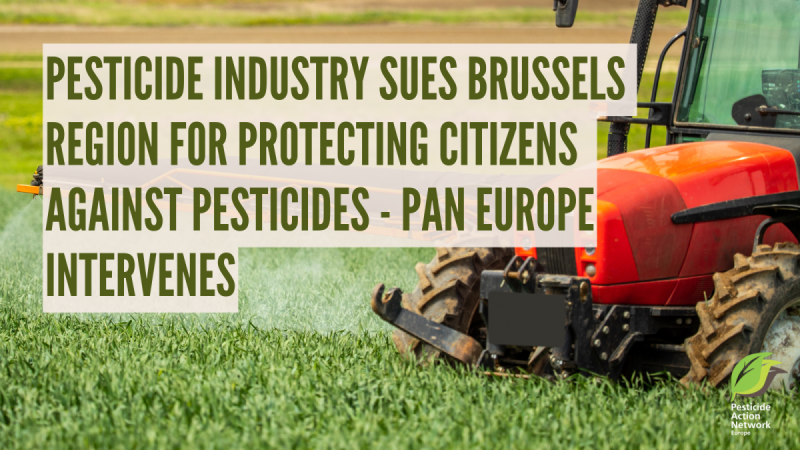The Brussels region decided to strongly restrict the use of synthetic pesticides in agricultural land to protect citizens' health and the environment. It is the first time that an EU region or country properly implements the provisions of the Directive on the Sustainable Use of Pesticides (SUD) from 2009. Brussels was immediately sued by the lobby organisation of the pesticide industry Belplant. Jointly with its member Nature et Progrès Belgique and two local organisations, PAN Europe intervenes in support of the Brussels region.
Since 2009 the Directive on the Sustainable Use of Pesticides (SUD) has applied. Some Member States have partly implemented it, others have not. For instance, Luxembourg, France, Belgium, the Netherlands and Sweden have banned the use of pesticides in public spaces, to protect citizens' health and the environment. France and Sweden also banned the use of synthetic pesticides by private users.
Restricting pesticides to protect citizens and the environment from direct exposure to agrochemicals is mandatory under EU law. Article 12 from the SUD directive 2009/128/EC states that EU Member States (or regions) are to prohibit or restrict the use of pesticides other than the least toxic ones (low-risk substances and biopesticides), in order to avoid citizens' exposure and to protect Natura 2000 sites as well as water protection areas.
Have you ever seen a pesticide-free Natura 2000 area? Is your country severely restricting the use of synthetic pesticides over water catchment areas to avoid groundwater contamination with pesticides? The answer is unfortunately systematically "no".
Indeed, in a report from 2020, the European Court of Auditors evaluated the implementation of the SUD by Member States. The conclusion is that its implementation is poor and one of the reasons is very basic: the European Commission has never controlled if it was properly transposed into national or regional laws. This is supposed to be the duty of the Commission's and in particular its Directorate General for Health, but they simply failed to do their job. They should launch infringement procedures against Member States because none of them have transposed the SUD correctly. They should have set large non-sprayed buffer zones next to citizens' homes, next to schools and hospitals or next to hiking paths. Member States have also not ensured a gradual pesticide reduction through the implementation of alternatives to pesticides.
Last summer, the Brussels region was the first region to set a framework to implement the SUD and truly protect citizens, the environment and groundwater resources, against the harms of pesticides. The region decided that as of 2030, on its 244 hectares of agricultural land, synthetic pesticides would only be used as a last resort, only when preventative or less toxic pest control measures have failed.
Belplant, the Belgium pesticide industry umbrella organisation immediately sued the Brussels region. Jointly with its member Nature et Progrès Belgique, as well as the Brussels beekeepers (SRABE) and We Are Nature. Brussels, PAN Europe submitted on 16 December 2024 an intervention before the Belgian Council of State, in support of the Brussels region.
The intervention of the NGOs is crucial in several aspects. Firstly, based on their experience with pesticide legal procedures in Belgium and at the EU level, Nature et Progrès Belgique and PAN Europe provide a valuable contribution in terms of legal requirements. They can debunk the flawed arguments from Belplant, whose interest is solely to maintain their business of selling toxic agrochemicals, to the detriment of people's health and the environment. Second, the NGOs' intervention also represents the interest of civil society before the judges, illustrating how much citizens are fed up with pesticides and the numerous times people have expressed their will to cut pesticides. Lastly, through their scientific approach, the NGOs illustrate with scientific references the true need to restrict pesticides in such a densely populated area as the Brussels region.
In conclusion, one could say that the Capital of the EU is the first region to implement a 15-year-old EU directive, hopefully motivating the European Commission to do its job and ensure its implementation throughout the entire EU.
